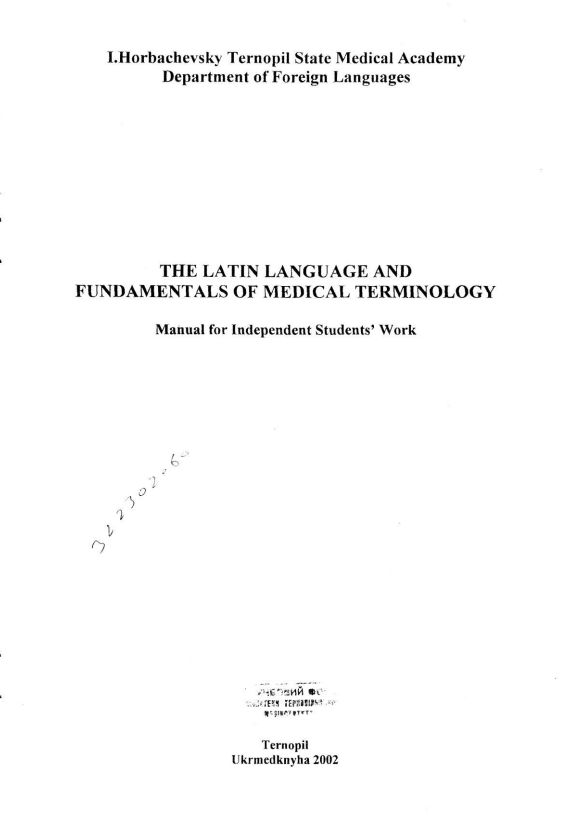LATIN APHORISMS AS A COMPONENT OF SOCIO-CULTURAL TRAINING OF MEDICAL STUDENTS
ЛАТИНСЬКА АФОРИСТИКА ЯК СКЛАДОВА СОЦІОКУЛЬТУРНОЇ ПІДГОТОВКИ СТУДЕНТІВ-МЕДИКІВ
| dc.creator | Kolodnytska, O. D. | |
| dc.creator | Palasiuk, H. B. | |
| dc.date | 2019-12-03 | |
| dc.date.accessioned | 2020-02-20T08:52:28Z | |
| dc.date.available | 2020-02-20T08:52:28Z | |
| dc.identifier | https://ojs.tdmu.edu.ua/index.php/med_osvita/article/view/10646 | |
| dc.identifier | 10.11603/me.2414-5998.2019.3.10646 | |
| dc.identifier.uri | https://repository.tdmu.edu.ua/handle/123456789/12575 | |
| dc.description | The article summarizes the experience of learning Latin aphorisms, quotes, sayings and proverbs at Latin lessons by medical students, and represents their samples, and their corresponding national equivalents in English and Ukrainian. Nowadays, it is difficult to name the branch of human activity where Latin phrases would not sound. Latin as a unifying link between antiquity and modern European culture promotes the formation of “homo moralis” (pure morality). Latin aphorisms absorbed the most valuable experience gained from the knowledge of man, natural phenomena, customs of the people, cultural life or history. They develop the intellectual level of the person, his/her outlook and give the opportunity to distinguish good from evil, unmistakably feel the truth and falsehood. Many biblical sayings (the Bible was translated into Latin in the IV century AD) are used in modern Ukrainian, English, French, Russian and other European languages. Wise and concise Latin proverbs (which express the precepts for descendants about interpersonal relationships), apt and witty aphorisms have taken the place of honor in the international multilingual phraseological foundation. This is certainly due to the great historical importance of Latin in the development of European civilization, science, culture, and education. In Latin lessons, we encourage medical students to study aphorisms on a variety of topics, including those that promote healthy lifestyles and condemn habits adversely affecting human health, such as alcohol abuse. The efficient implementation of Latin aphorisms as a component of socio-cultural training in medical schools provides the highest quality of the educational process. | en-US |
| dc.description | У статті узагальнено досвід вивчення латинських афоризмів, цитат, приказок і прислів’їв на заняттях із латинської мови студентами-медиками та представлено їх еквіваленти англійською та українською (афоризми із закликом старанно вчитися, на патріотичну тематику, біблеїзми) мовами. Сьогодні важко назвати сферу діяльності людини, де не звучали б латинські вислови. Латина як єднальна ланка між античністю та новітньою європейською культурою сприяє формуванню «homo moralis» (чистої моралі). Латинські афоризми увібрали в себе найцінніший досвід, набутий у результаті пізнання людини, явищ природи, звичаїв народу, культурного життя чи історії. Вони розвивають інтелектуальний рівень людини, її світогляд і дають можливість відрізняти добро від зла, безпомилково відчувати правду та неправду. Багато біблійних висловів (Біблія була перекладена на латинську мову в IV столітті н. е.) використовуються в сучасній українській, англійській, французькій, російській та інших європейських мовах. Мудрі й лаконічні латинські прислів’я висловлюють заповіді нащадків про міжособистісні стосунки, влучні і дотепні афоризми посіли почесне місце у міжнародному багатомовному фразеологічному фонді. Це, безумовно, пояснюється великим історичним значенням латинської мови у розвитку європейської цивілізації, науки, культури та освіти. На заняттях з латинської мови ми заохочуємо студентів-медиків вивчати афоризми з різних тем, включаючи такі, що пропагують здоровий спосіб життя та засуджують звички, що негативно впливають на здоров’я людини, наприклад, зловживання алкоголем. Ефективне впровадження латинських афоризмів як складової соціокультурної підготовки у вищих медичних навчальних закладах забезпечує найвищу якість навчального процесу. | uk-UA |
| dc.format | application/pdf | |
| dc.language | ukr | |
| dc.publisher | Ternopil State Medical University | uk-UA |
| dc.relation | https://ojs.tdmu.edu.ua/index.php/med_osvita/article/view/10646/10147 | |
| dc.source | Medical Education; No. 3 (2019); 39-43 | en-US |
| dc.source | Медична освіта; № 3 (2019); 39-43 | uk-UA |
| dc.source | 2414-5998 | |
| dc.source | 1681-2751 | |
| dc.source | 10.11603/me.2414-5998.2019.3 | |
| dc.subject | Latin aphorisms | en-US |
| dc.subject | Latin quotes | en-US |
| dc.subject | Latin sayings | en-US |
| dc.subject | Latin proverbs | en-US |
| dc.subject | medical students | en-US |
| dc.subject | латинські афоризми | uk-UA |
| dc.subject | латинські цитати | uk-UA |
| dc.subject | латинські приказки | uk-UA |
| dc.subject | латинські прислів’я | uk-UA |
| dc.subject | студенти-медики | uk-UA |
| dc.title | LATIN APHORISMS AS A COMPONENT OF SOCIO-CULTURAL TRAINING OF MEDICAL STUDENTS | en-US |
| dc.title | ЛАТИНСЬКА АФОРИСТИКА ЯК СКЛАДОВА СОЦІОКУЛЬТУРНОЇ ПІДГОТОВКИ СТУДЕНТІВ-МЕДИКІВ | uk-UA |
| dc.type | info:eu-repo/semantics/article | |
| dc.type | info:eu-repo/semantics/publishedVersion |
Files in this item
| Files | Size | Format | View |
|---|---|---|---|
|
There are no files associated with this item. |
|||

